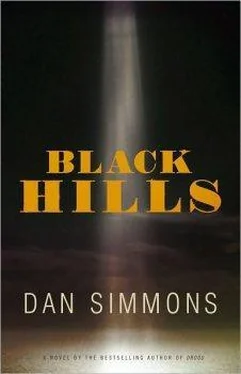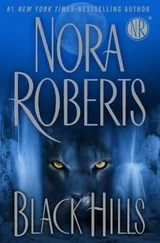— Not yet, Boss. I’ll wait ’til you finish all the heads before I bring them all down.
Borglum coughs a laugh, signals his son, and is cranked up into the winch house.
It is an old joke between them and the question and answer, always the same, have long since been wrung dry of any remaining humor. But does Borglum ever suspect, Paha Sapa wonders, that his premier powderman is telling him the truth?
Chapter 3 Along the Greasy Grass

June 1876
PAHA SAPA SIPS THE WARM SOUP. ALL THE FINELY SCRAPED buffalo hide walls of Limps-a-Lot’s lodge glow orange from the multitude of fires burning in the village outside. It is very late, but a cacophony of singing and chants and the thudding of drums can be heard—cacophony to Paha Sapa’s ears because it is a harsh and unusual mixture of celebrations and mournings, peppered throughout by screams of mourning women, exultant cries from celebrating warriors, and the continued rifle shots from both within the camp and from more distant shots echoing from the dark hills across the river to the southeast. Hundreds of warriors, many of them blind drunk by now, are taking turns trying to sneak up on the surviving wasichus surrounded up there, shooting at the soldiers whenever they think they see the dark shape of a head or body poke up from the dug-in circle of bluecoats cowering on the dark hilltop.
Besides Limps-a-Lot, there are three other older men in the lodge: Tatanka Iyotake (Sitting Bull), Foolish Elk, and an old Rock-dreamer yuwipi holy man named Long Turd. Paha Sapa, only half listening to the desultory talk among the old men, realizes that Long Turd is saying that he spent much of the afternoon’s battle conferring with Crazy Horse, even going so far as to build a holy fire of buffalo chips to pray over during one of the pauses when Crazy Horse and his men were gathering fresh ponies. At the mention of Crazy Horse’s name, Paha Sapa flushes with shame. He hopes he will never have to see Limps-a-Lot’s older wife’s cousin again.
— Black Hills, tell us what you have to tell us.
It is Sitting Bill who gives the command. Even though most of the younger warriors have been talking and celebrating as if the day’s work has been a huge victory, Sitting Bull sounds so sad that one would think it has been a great defeat for the Lakota and Cheyenne. And while Limps-a-Lot, Long Turd, and the younger Foolish Elk have all dressed more formally for the evening, Sitting Bull, who is old—he has seen at least forty-two summers according to Limps-a-Lot—is wearing his everyday outfit of a fringed buckskin shirt embroidered only with green porcupine quills and modest tassels of human hair attached at the shoulders, leggings, moccasins, and a red breechcloth. His braids are wrapped in otter skins and adorned with a single eagle feather set upright.
Paha Sapa nods, sets down his soup, composes himself cross-legged on the soft hide, and thinks about what he will say. Limps-a-Lot has told the other three men about the ghost—it is why they are here tonight listening to a boy rather than out celebrating or mourning or, in Foolish Elk’s case, up the hill shooting at the surviving wasichus —and Paha Sapa knows that it is the identity of the bluecoat whose ghost he carries that most interests the two holy men and the warrior-friend of Crazy Horse here.
Paha Sapa closes his eyes for a minute to bring the afternoon’s events out of the smoke and haze of the day’s terrible memory. He hopes that when he opens his eyes to speak—and to speak as succinctly as Limps-a-Lot taught him as a small boy and as clearly as he can given the Wasicun’s ghost’s continued gibbering and throbbing in his mind—the few flat, emotionless words will emerge almost in the form of a monotone chant. But before he opens his eyes to speak briefly, Paha Sapa takes time to recall it all in detail.

HE HAD NOT COME TO FIGHT. Paha Sapa knew he was no warrior—his single, sad expedition against the Crow the previous spring had taught him that—but that afternoon, when the shooting started at the southeast end of the huge village of tipis that filled the valley, he and Limps-a-Lot ran out of the older man’s lodge. It was very exciting. Akicita were trying to keep order, but the young warriors were ignoring the tribal police, shouting and leaping onto their mounts and riding toward the noise of battle. Other braves were rushing to put on their war paint, find their weapons, and chant their death songs. Although Paha Sapa knew he was no warrior at heart, he felt the excitement rise in him as the sound of shooting continued, the dust clouds rose from the east and from the bluffs across the river, and the men of all ages continued to ride out of the village in whooping packs.
— The fighting is at the far end of the village .
Limps-a-Lot pointed to the southeast.
— I want you to stay here until I get back.
And, carrying no weapons, Limps-a-Lot walked slowly away toward the shooting.
Paha Sapa tried to stay put, even when Wolf Eyes, Left Foot, and several other young men he’d met here at the giant gathering rode by, taunting him and shouting for him to find a pony. But they had ridden off to the south before Paha Sapa could decide what to do.
Then there was more shooting coming from the direction of the coulee there at the north end of the village, almost in the opposite direction of the original firing. Paha Sapa had looked up minutes earlier and seen a line of wasichus on horseback moving northwest along the line of bluffs. Was the bluecoat attack at the southeast end of the village merely a feint, Paha Sapa wondered, a distraction—with the full attack coming here at the opposite end where the women and children were gathering? Sitting Bull himself had told Limps-a-Lot only three nights ago that this was a strategy that Long Hair had used when the Wasicun war leader attacked Black Kettle’s village.
A woman screamed that the bluecoats were coming down the coulee and crossing the river at the ford not far from Limps-a-Lot’s lodge, close to where so many of the women and children had gathered. A group of warriors, their horses and their oiled bodies covered with dust from the fighting in the southeast, galloped north through the center of the village to face this new threat, scattering old men, women, and screaming toddlers as they came. A horse trailing that group was without a rider, showing a streak of blood on the blanket. As the riders paused briefly between the lodges to allow the scattering women to get out of their way, this riderless mare came almost to a stop at the rear of the mass of horses and shouting men, her eyes rolling whitely.
Without thinking, Paha Sapa leaped up onto the mare’s back, wrapping both hands in its mane. When the mounted warriors forced past the screaming women and galloped toward the river, Paha Sapa hung on and kicked his heels into the mare’s heaving ribs. It was unnecessary—the animal’s blood was up and, like Paha Sapa’s, its instinct was to run with the herd.
The sound of shooting still came from the long coulee that ran up to the bluffs from the river, and through the dust and smoke, Paha Sapa could see several bodies in the dirt there—some wasichus , several warriors from the village—but whoever was leading this band ignored the coulee and kept going northeast along the river, past bands of fleeing women and children, past the last Lakota and Cheyenne lodges, through the cottonwoods, until the thirty or so mounted warriors with Paha Sapa bringing up the rear splashed across at the second ford and galloped up a deep ravine toward the grassy bluffs above. Paha Sapa almost slipped off as the mare climbed the steep terrain but hung on to the mane with both hands and pressed his knees tight against the horse’s laboring barrel chest as the wheezing, frothing mare, her lungs sounding like a leaky bellows, staggered up onto the grassy ridge.
Читать дальше














